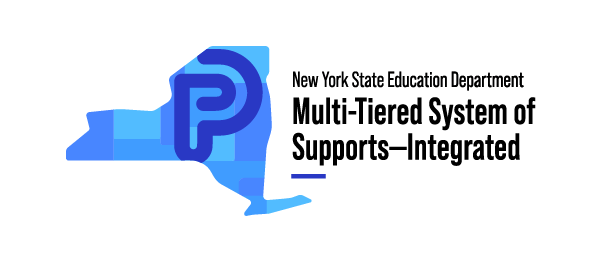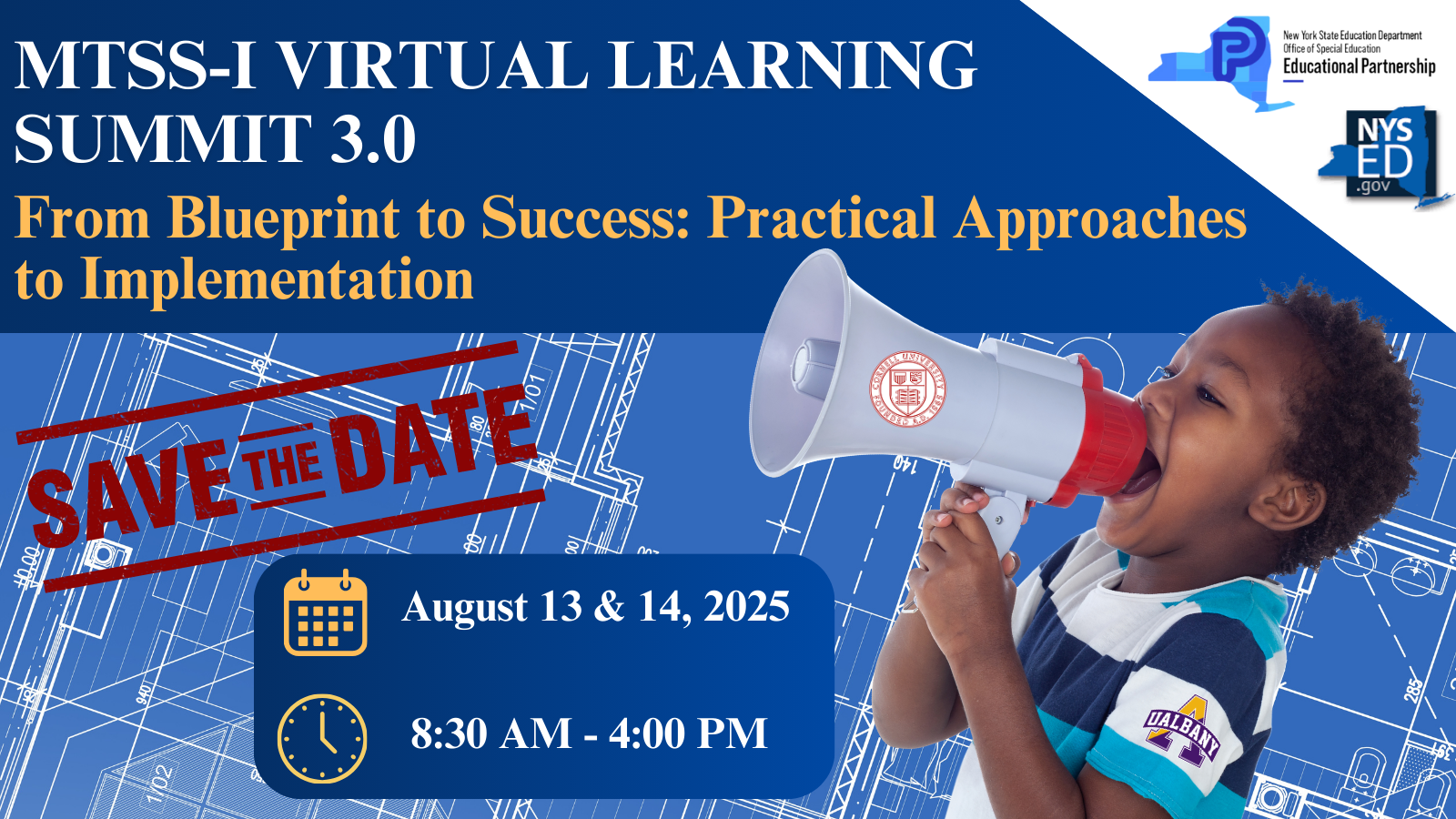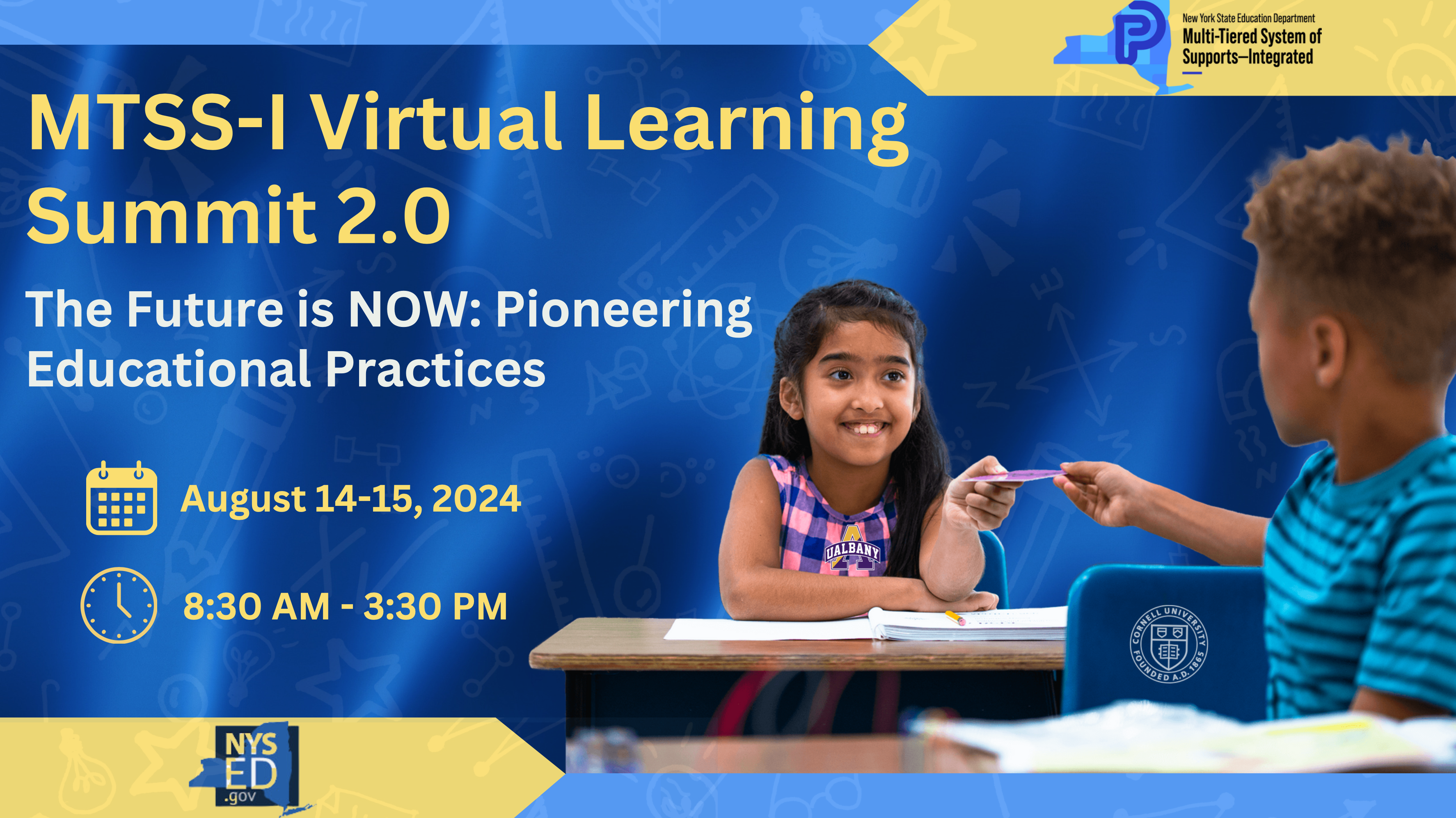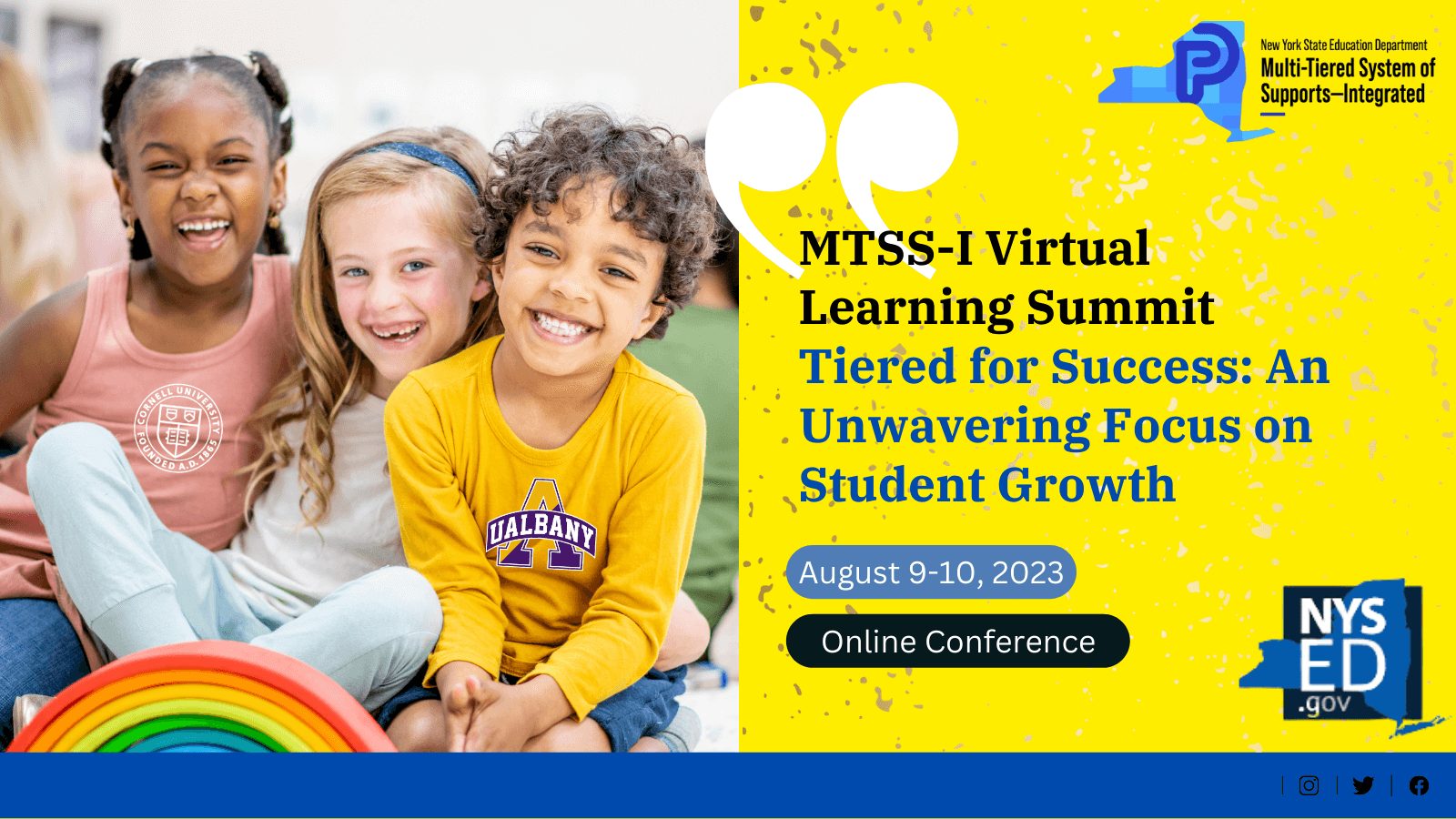Multi-Tiered System of Supports–Integrated (MTSS-I)


The resources shown are designed to provide helpful information. Resources are provided for instructional use purposes only and do not constitute NYSED endorsement of any vendor, author, or other sources. To the best of our knowledge, the resources provided are true and complete. In addition, the NYSED MTSS-I Framework is not yet a NYS approved framework. Hence, a draft of the Framework is being used to inform this work.
About NYSED MTSS-I Center
The MTSS-I Center’s mission is to improve outcomes for all students by building capacity in educational organizations (EOs) to deliver evidence-based practices within a tiered system. The MTSS-I Center will empower education stakeholders, and support teachers and other professionals in effective practices for improved students’ results.
Description of Program

NYSED was awarded the State Personnel Development Grant (SPDG) to focus on improving results for students, particularly students with disabilities, by establishing a statewide MTSS-I center. SPDG for 2020 - 2025 is focused on assisting teachers and leaders, with attention to State and local systems of support at the pre-service and in-service levels, to improve teaching and learning, and thus, student outcomes. Specifically, the work under the SPDG will strive to improve the current oversight of MTSS-I by creating a collaborative leadership team with statewide partners and staff within NYSED, expand MTSS-I application to identified districts, and help districts utilize evidence-based professional development for reading instruction and behavior using Implementation Science in an integrated model of MTSS.
NYSED’s MTSS-I will integrate academics and behavior to be promoted at the pre-service and in-service levels. MTSS-I will expand the work and successes begun through the State Systemic Improvement Plan (SSIP) to reach a greater number of districts, buildings, and teachers implementing evidence-based strategies and to scale up these practices for future sustainability through the work of the Office of Special Education’s (OSE’s) Educational Partnership (“the Partnership”). To this end, part of the SPDG award has been utilized to create the MTSS-I Center, which is located at the University at Albany.
Using the approved materials and in coordination with the Partnership (i.e., TAP for Academics, TAP for Behavior), the MTSS-I Center is supporting 29 public school districts (“districts”) through a grant-funded opportunity. These districts will work directly with the MTSS-I Center and the Partnership to implement MTSS-I. Each district will receive funding, professional development, and technical assistance to support their efforts.
The MTSS-I Center will provide:
- technical assistance and ongoing support through attendance at meetings (both virtual and in-person) with coaches and teams, as well as email and telephone contact;
- pertinent materials as part of the training process to use with the team and staff in the building and district;
- assistance to the district and building in collecting, analyzing, and using student data (e.g., attendance, suspension, office referrals, etc.) and systems data (e.g., Tiered Fidelity Inventory (TFI), Reading-Tiered Fidelity Inventory (RTFI), etc.), as well as other feedback mechanisms to set goals and monitor progress;
- coaching support in the form of systems-level coaching to the School Leadership Teams and to the grade-level teams;
- support technology integration including data systems;
- data coordination support (support with ongoing use of measures, and data systems post installation and initial implementation);
- content and implementation expertise; and
- a 2-day virtual learning summit for stakeholders.


District-level Administrator Commitment and Expectations
The 29 districts will invest in and support the implementation of MTSS-I for three years. This commitment will include the:
- identification of up to three schools within the district to implement MTSS-I;
- use of a draft framework to be piloted and revised;
- establishment of district- and school-level teams to support tiered implementation; and
- the allocation of time and resources to support the professional development of district and school level leaders, teams and staff on MTSS-I and related evidenced-based practice.
Cohorts
The MTSS-I Center will support up to 29 districts across the life of the project through the delivery of onsite and virtual training and coaching and will conduct and monitor fidelity of implementation of evidence-based practices by coaches and teachers in demonstration districts.
MTSS-I Framework Pathways to Implementation
Download Pilot Framework Document (PDF)Resources
Below you will find resources relating to the integration of:
- The OSE Educational Partnership Public Website
- Center for Positive Behavioral Interventions and Supports
- Positive Behavior Interventions and Supports Readiness and Tier 1 Team Training: Readiness and Curriculum
- PBIS Tier 2 Team Training: Systems and Check-in, Check-out
- Using the Competing Behavior Pathway to Identify Interventions
- The Language of Classroom Management: Promoting Positive Teacher-Student Interactions and Relationships
Behavior
- The OSE Educational Partnership Public Website
- NYSED Next Generation ELA and Mathematics Learning Standards and Professional Development Toolkits
- Supporting All Students: Scaffolding Instruction of ELA and Mathematics Turnkey Guidance document and PowerPoint
- Supporting All Students: Resource Guides for Scaffolding Instruction of ELA and Mathematics
- Best Practices in Academic Progress Monitoring Introduction
- Universal Screening: Best Practices in Screening for Academic Deficits
- National Center for Intensive Intervention Identifying Assessments
- NYS P-12 Science Learning Standards and Science Updates Webpage
- Computer Science and Digital Fluency
- Identifying and Intensifying Intervention: What to Do and How to Do It
- Foundations of Effective Reading Instruction: Understanding the Science of Reading
- Standards and Instruction Webpage
- 2017 New York State P-12 Learning Standards for the Arts
- Teaming to Promote Literacy: Establishing Effective Literacy Practices Using the Reading Tiered Fidelity Inventory
- Reading Tiered Fidelity Inventory (R-TFI)
- NYS Community Schools Technical Assistance Centers
Academics
- New York State Social Emotional Learning Benchmarks, Framework, and Implementation Guide
- Guidance Pertaining to Commissioner’s Regulation §100.2(j) Guidance Programs and Comprehensive Developmental School Counseling/Guidance Programs
- The National Center for Traumatic Stress Network Child Trauma Toolkit for Educators
- The Denver School-Based Restorative Practices Partnership School-Wide Restorative Practices: Step by Step
- NYS Center for School Safety
Social Emotional Learning
- Mental Health Education Literacy in Schools: Linking to a Continuum of Well-Being Comprehensive Guide
- The National Center for Safe Supportive Learning Environments offers a Trauma-Sensitive Schools Training Package
- The National Center for Traumatic Stress Network Child Trauma Toolkit for Educators
- NYS Center for School Health
Mental Health
- Language Magazine: Why UDL Matters for English Language Learners
- UDL for English Language Learners
- Journal of Educational Research and Practice: Increasing Engagement of English Learners Through Universal Design for Learning
- Blackboard: Accessibility and Universal Design for Learning
- Universal Design for Learning: Classrooms that Support International and English Language Learners
Universal Design for Learning (UDL)
- Physical Education Learning Standards
- NYS Center for School Health
School Health Services
- Planning for High-Quality Prekindergarten Programs
- Publications NYS Early Childhood Advisory Council
- New York State Early Learning Standards
- The Pyramid Model for Supporting Social and Emotional Competence in Infants and Young Children
- Early Childhood Technical Assistance (ECTA) video series on supporting preschool children in virtual services
- Function Based Thinking: Applying a Proactive Process to Support Student Behavior in the Classroom
Early Learning
- Using the Functional Behavior Assessment (FBA)/Behavior Intervention Plan (BIP) Process to Support Students Needing of Intensive Intervention
- Using the Competing Behavior Pathway to Identify Interventions
- National Center for Intensive Intervention Identifying Assessments
- Supporting All Students: Resource Guides for Scaffolding Instruction of English Language Arts and Mathematics
- Identifying and Intensifying Intervention: What to Do and How to Do It
- Foundations of Effective Reading Instruction: Understanding the Science of Reading
Special Education
- NYSED Office of Bilingual Education and World Languages
- New York State Regional Bilingual Education Resource Network
- Supporting All Students: Resource Guides for Scaffolding Instruction of ELA and Mathematics
- Language Magazine: Why UDL Matters for English Language Learners
- UDL for English Language Learners
- Journal of Educational Research and Practice: “Increasing Engagement of English Learners Through Universal Design for Learning
- Blackboard: Accessibility and Universal Design for Learning
- Universal Design for Learning: Classrooms that Support International and English Language Learners
- NYSED's MTSSI-I Pilot Framework: Supporting English Language Learners (ELL)
English Language Learners
- Culturally Responsive-Sustaining Education
- NYSED Culturally Responsive-Sustaining Education Framework
- NYSED Diversity, Equity, & Inclusion
- Education Justice Research and Organizing Collaborative (EJ-ROC) at NYU Metro Center Culturally Responsive Education Resource Hub
- US Dept. Of Education Regional Equity Assistance Center at The Center for Educational Equity at MAEC
- CRPBIS: Culturally Responsive Positive Behavioral Interventions and Supports at Center for Education Research U. of Wisconsin-Madison
- Center on Positive Behavioral Interventions and Supports (PBIS) Equity
- Schoolwide Integrated Framework for Transformation (SWIFT) Center
- National Center on Safe Supporting Learning Environments
- National School Climate Center at Ramapo for Children
- The National Education Policy Center: The Starts and Stumbles of Restorative Justice in Education: Where Do We Go from Here?
Culturally Responsive Education and Equity
- NYSED Teaching in Remote/Hybrid Learning Environments
- eTeachNY Website
- NYSED Computer Science and Digital Fluency
- Early Childhood Technical Assistance (ECTA) video series on supporting preschool children in virtual services
- Virtual Learning Guidance Memo
Virtual/Hybrid Learning Environments
- NAFSCE Family Engagement Core Competencies
- Family and Community Partnerships Reflection Tool for Family-Facing Professionals
- Toolkit of Resources for Engaging Families and the Community as Partners in Education
- Multi-Tiered Approach to Family Engagement
- Center on PBIS - Family
- ENHANCING FAMILY–SCHOOL COLLABORATION WITH DIVERSE FAMILIES
- Dual Capacity-Building Framework
Family Engagement

MTSS-I Virtual Learning Summit 3.0
From Blueprint to Success: Practical Approaches to Implementation
August 13-14, 2025
Visit Conference Page
MTSS-I Virtual Learning Summit 2.0
The Future is NOW: Pioneering Educational Practices
August 14-15, 2024
Visit Conference Page
MTSS-I Virtual Learning Summit
Tiered for Success: An Unwavering Focus on Student Growth
August 9-10, 2023
Visit Conference Page